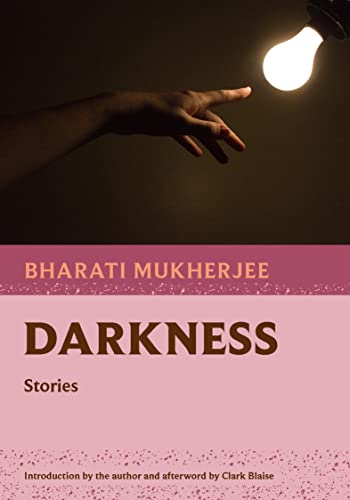Darkness: Stories

“For readers, writers, immigrants, patriots, and expatriates the world over, Darkness by Bharati Mukherjee is a study in excellence of a short story’s highest achievement.”
The 12, starkly realistic and fully realized short stories in Bharati Mukherjee’s Darkness incrementally tell of Indian immigrants reconciling an opportunity to make a fresh, upwardly mobile start with the hard knocks of being a stranger in a strange land. The characters’ inherent faith, cultural, and social mores are weighed against new frontiers in their search for footing. Their struggles concern what to maintain and what to shed in the face of family loyalty, racism, and ingrained tradition. In the interest of a bright future, the characters divest themselves of religious doctrine and caste systems that don’t migrate. They persevere in the search for identity as they chisel their way in a land of promise. In braving to push boundaries, they are made aware of their limits.
In this updated collection of classic short stories, the universally lauded Bharati Mukherjee writes in her 1992 author introduction, “I have joined imaginative forces with an anonymous, driven underclass of semi-assimilated Indians with sentimental attachments to a distant homeland but no real desire for permanent return.”
The characters in Darkness are of all ages and represent the immigrant experience from multiple points of view. Some are in arranged marriages, some are single, and some are divorced. The short stories portray characters in different settings. They differ in gender, background, faith, and occupation. Each impactful story is predicated on what it means to be a fish out of water.
In “The Imaginary Assassin,” a first-generation American tells of her family lore that led from a dusty, Ludhiana village to Yuba City California. “The plan had been for grandfather to slip into the illegal alien’s underground at the end of the visit, make a fortune, then bring in the rest of his family.” The narrator confesses that as an adolescent, “The shabby diligence of our immigrant lives in Yuba City shamed the romantic in me,” but one night, her grandfather sets her imagination ablaze by recounting a fantastic tale—in a mixture of Punjabi and English—of his involvement in the assassination of Mahatma Gandhi.
A memory of the divided nation between Hindus and Muslims sets the stage for “The Lady From Lucknow.” Nafeesa Hafeez, the Indian narrator now living in Atlanta, compares her ill-fated, extramarital affair with an America to a long ago scandal in Lucknow, which she can’t help but use as a frame of reference when her affair is exposed. Hafeez concludes, “I have lived a life perched on the edge of ripeness and decay. The traveler feels at home everywhere because she is never at home anywhere.”
Immigrating to Canada has its complex challenges. In “The World According to Hsu,” it is said of half Indian and half Czechoslovakian freelance journalist, Ratna Clayton, “In Montreal she was merely English, a grim joke on generations of British segregationists . . . In Toronto, she was not Canadian, not even Indian. She was something called, after the imported idiom of London, a Paki. And for Paki’s, Toronto was hell.” On holiday with her Canadian husband, on an island off the coast of Africa, in the middle of a revolution, Ratna navigates the locals who try to place her nationality. Mukherjee writes in laser-sharp language devoid of emotion when Ratna, in a restaurant full of fellow travelers, pours herself a glass of wine, “feeling for the moment at home in that collection of Indians and Europeans babbling in English and remembered dialects. No matter where she lived, she would never feel so at home again.”
That this powerful collection of timeless short stories is now back in print with Godine Nonpareil imprint is a gift to benefit Mukherjee devotees and new readers alike. Such literary luminaries as Amy Tan, Robert Olen Butler, and Joyce Carol Oates have written glowing endorsements of Indian American Canadian Bharati Mukherjee’s body of work, and this collection exemplifies the reason. Mukherjee lays bare the method behind her magic, when she writes fitting words for this collection in Darkness’s introduction: “For a writer, energy is aggression: urgency colliding with confidence. Suddenly, everything is possible. Excluded worlds are opened, secretive characters reveal themselves. The writing-self is somehow united with the universe.”
For readers, writers, immigrants, patriots, and expatriates the world over, Darkness by Bharati Mukherjee is a study in excellence of a short story’s highest achievement.